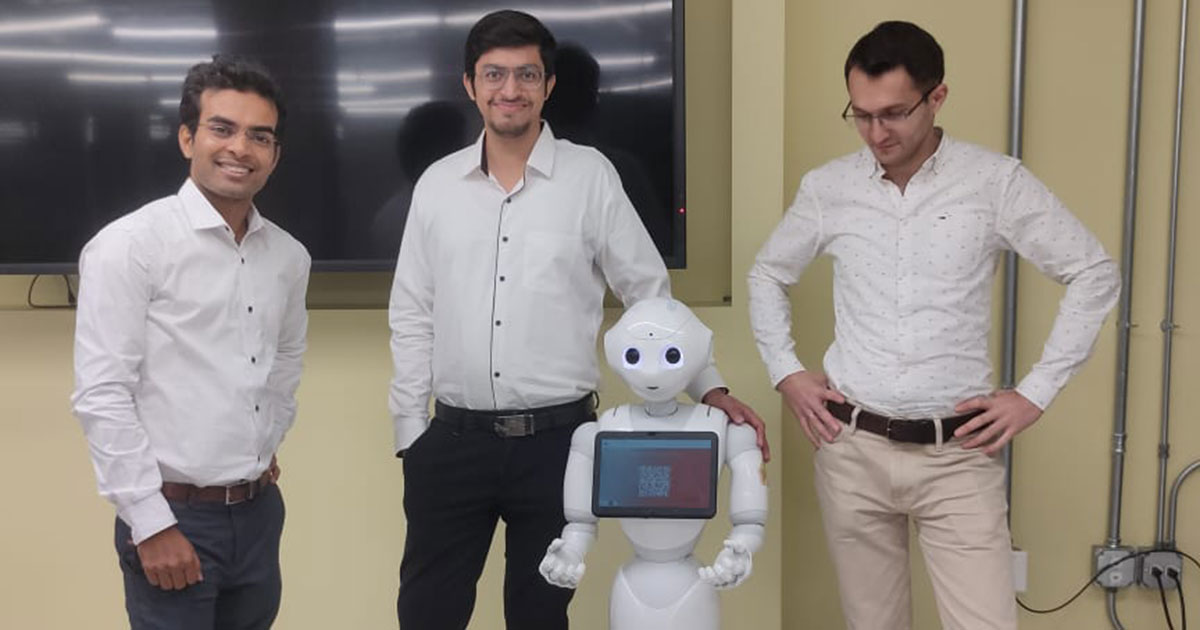Putting IoT Knowledge to Use
Three Northwestern Engineering students, including two from the Master of Engineering Management (MEM) program, recently visited the Chicago Connectory and offered support on Pepper, the world’s first social humanoid robot.

Addvesh Bisen (MEM '22) wants to be a leader working at the confluence of product management and analytics. That aspiration led him to Northwestern's Master of Engineering Management (MEM) program, and drove him to help establish a new partnership between MEM and the Chicago Connectory, an incubator formed by Bosch and 1871 that focuses on the Internet of Things (IoT).
"It is always important to form collaborations to achieve big feats and results," Bisen said. "IoT and artificial intelligence are vast subjects. Since the Connectory is a hub for IoT in Chicago and many firms are now working with the Connectory, it would be a great place for students to learn more about the demand in the industry."
Bisen recently was accompanied by Giorgi Gulabyan (MEM '22) and Vinit Todai (MSAI '22), a student in Northwestern Engineering's Master of Science in Artificial Intelligence (MSAI) program, on a visit to the Connectory, where they met with Robert Wildeman, who helps facilitate partnerships between the Connectory and local universities.
The students toured the facility and met Pepper, the world’s first social humanoid robot designed to recognize faces and basic human emotions. Pepper was optimized for human interaction and engages with people through conversation and a touch screen. At the time, the robot was unable to interact effectively through its interface. The students were given the chance to examine the robot and discovered multiple issues with its Python programming and platform. The students began fixing the issue before leaving for the day. They remained in touch with contacts at the Connectory and hope to return to help finish the problems in the coming weeks.
"This type of error correction needs AI and IoT knowledge that we learn in MEM," Bisen said. "We also used management knowledge gained from our leadership class to focus on a common purpose understood by all stakeholders."
The students and MEM were invited to join the Connectory as partners to offer additional support related to IoT innovation projects. Sample projects Bisen said he envisions students assisting with include creating quadcopters for industrial use, advanced virtual reality pods, predictive maintenance systems, working more on self-driven vehicle platforms, and helping launch startups that can be funded by the Connectory.
MEM Director Mark Werwath said this type of partnership demonstrates the power and impact of the MEM experience.
"This shows how quickly and effectively the MEM students can integrate into the fabric of the tech ecosystem here in Chicago," Werwath said. "Not only did Addvesh establish a relationship, he was able to add value almost immediately with his technical skills and was able to show how applicable the skills of MEM students are to current day technical challenges."
Bisen's initiative is also indicative of what it takes to be an effective leader, Werwath said.
"Addvesh demonstrated the necessary initiative and willingness to engage with the community," Werwath said. "He reached out, he met with people, and he immediately saw a need that he could contribute to. Engineering managers of the future aren’t just folks with big offices and fancy desks and grandiose ideas, they are people who can still roll up their sleeves and solve technical challenges in the here and now.

